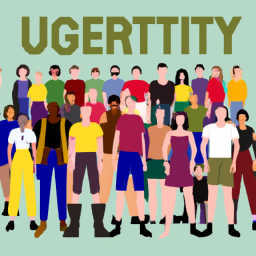The erasure of lesbian history and culture in India, in favour of a monolithic society, has been a cause for concern in recent years. The LGBT movement has been increasingly vocal in its demands for rights and recognition, and has been met with opposition from the right-wing political establishment. This article will explore the impact of right-wing politics on the LGBT movement in India and the ways in which censorship has been used to suppress it.
The concept of “political lesbianism” has been a powerful tool for the LGBT movement, allowing for a re-framing of lesbian identities and experiences as a form of political activism. In the words of one activist, “I don’t need to try being a lesbian, because in political lesbianism, I can just be a person, like a normal person – a human being.” In this way, the LGBT movement has sought to challenge the traditional patriarchal structures that have suppressed lesbian voices and experiences.
After the “sex wars” of the 1980s that debated the need for political lesbianism and celibacy in the face of patriarchal sexual violence, the LGBT movement in India has become increasingly vocal in its demands for rights and recognition. This has been met with resistance from right-wing political entities, who have sought to suppress the movement through censorship and the use of draconian laws.
The Indian government has been particularly repressive when it comes to censorship of LGBT content, often using the archaic laws of the country to clamp down on expression and dissent. This has included censorship of films, television shows, and books, as well as the use of the criminal justice system to target LGBT activists.
Right-wing politicians have also sought to use the LGBT movement as a political tool to stoke fear and prejudice in society. This has included the use of inflammatory rhetoric to stir up public sentiment against the LGBT movement and to create a climate of intolerance in society.
The Indian LGBT movement has also faced a backlash from religious authorities, who have sought to use their influence to stifle the movement. This has included the use of religious edicts and public campaigns to demonize homosexuality and to paint the LGBT movement in a negative light.
Censorship of LGBT content has also been used to obscure lesbian history and culture, and to promote a monolithic view of sexuality. This has included the banning of books and films that discuss lesbian relationships, as well as the suppression of lesbian activism and expression.
Despite the challenges posed by right-wing politics and censorship, the LGBT movement in India has made progress in recent years. This has included legal victories, increased visibility in the media, and the emergence of powerful LGBT role models.
These developments have been met with resistance from right-wing entities, who have sought to undermine the progress made by the LGBT movement. This has included the use of homophobic rhetoric and the passing of laws that suppress the rights of LGBT individuals.
The struggle for LGBT rights in India is far from over, and the movement is still facing significant opposition from right-wing entities. However, the progress made in recent years has been a testament to the strength and resilience of the LGBT movement in India.
The LGBT movement in India has also been a powerful force for social change, inspiring people of all genders and orientations to stand up for their rights and for a more inclusive society. As the movement continues to grow, it is likely that India will become a more tolerant and accepting place for LGBT individuals.
The LGBT movement in India has been a source of hope and inspiration for many, and has helped to create a more accepting and inclusive society. Despite the challenges posed by right-wing politics and censorship, the movement has made significant progress in recent years, and its continued success is essential for the future of India.
The LGBT movement in India has not only been a source of progress and hope, but also a reminder of the power of collective action and the importance of standing up for one’s rights. The movement has shown that change is possible, and that we can all make a difference.
The LGBT movement in India has been a powerful force for social change, and it is essential that we continue to stand together in support of its goals. As we move forward, let us remember that we are all part of the same struggle for a more inclusive and tolerant society.
